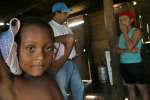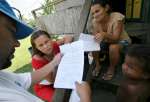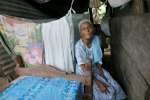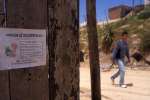Refugee and Costa Rican youth use radio to tackle xenophobia in schools
News Stories, 25 January 2010
SAN JOSE, Costa Rica, January 25 (UNHCR) – Sitting in front of a microphone in a Costa Rican recording studio, Annye tells how an irregular armed group in her native Colombia threatened the life of her brother some eight years ago, prompting her family to flee the country.
"If my father did not pay them a specific sum of money, they would kill my brother," said the 16-year-old refugee, who has been taking part in a UNHCR project aimed at spreading awareness about refugees and combatting xenophobia in Costa Rica's high schools.
According to a UNHCR survey conducted two years ago, 40 per cent of young refugees in Costa Rica say they have been the victims of intolerance or insulted by their classmates or teachers.
Under the project, Annye and 13 other teenagers – refugees and Costa Ricans – recorded a series of radio stories aimed at giving students around the country a greater understanding of what it means for a young person to be forced to flee their home and leave so much behind because of violence or persecution.
"For UNHCR it has become crucial to create a tool to combat xenophobia in schools, to inform children about who the refugees are and why they need our support to integrate into this new community," said Jozef Merkx, UNHCR's representative in Costa Rica.
Having children tell their peers about their suffering, helps make the issue much more personal and real. It can also create sympathy and bonds between young people of different nationalities and backgrounds.
The radio stories, which were developed with help from the Radio Netherlands Training Centre (RNTC) and UNHCR's local partner, ACAI, will form part of an education module being developed to counter xenophobia in schools. "The idea is to distribute the module in April, as a pilot project, to schools in locations with a large migrant and refugee presence," Merkx said. It will then be used in other areas.
The Colombian refugees and local children who took part in the two-day project, held here recently, started off by learning the nuts and bolts of broadcasting. The stories were then recorded.
"We reviewed the basics of how to make radio stories and we also explored the rights of refugees," explained RNTC producer, Arturo Meoño. "With Costa Rican and refugee high school students taking part, we were able to hear two sides of the issue: the perceptions of young refugees on their life in Costa Rica and the reaction of young local people on the life stories, rights and experiences of refugees."
Psychologist Maria Andrea Araya said the approach made for an interesting mix of stories and reactions. "Some concentrate on the flight from violence and the challenges of local integration; others prefer to discuss what young refugees in Costa Rica experience in their daily lives."
Leidy, a 16-year-old refugee, talked excitedly about her love of Latin American music, while Karen, aged 15, complained about how refugees were often stereotyped unfairly. "When somebody gets angry with me, they call me a drug dealer," she noted.
Others mentioned incidents of xenophobia in Costa Rica, while also touching on positive experiences. "When we arrived here we saw that education and health were free," said Alexander, 15, adding that in Colombia, it was more a situation of "don't get sick, because there is no money to pay for the hospital bill."
Costa Rica provides shelter for some 12,000 refugees from about 40 nationalities, though more than 80 percent are Colombian. The country receives approximately 80 asylum seekers per month and also hosts a large migrant population. Since 2009, there have been small migratory movements through Costa Rica of Africans and Asians trying to reach North America.
By Andrea Vasquez in San Jose, Costa Rica












































